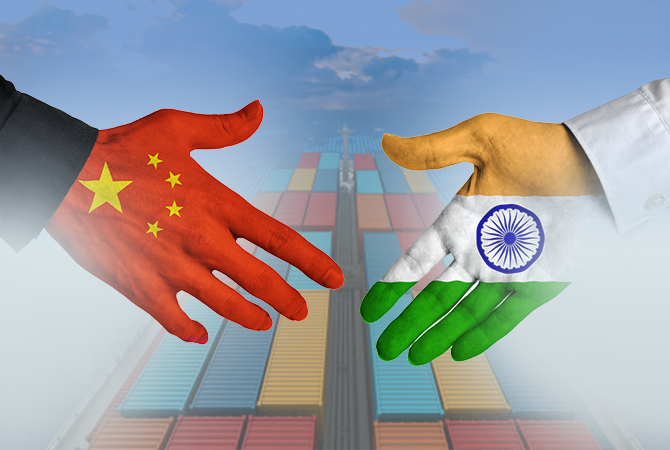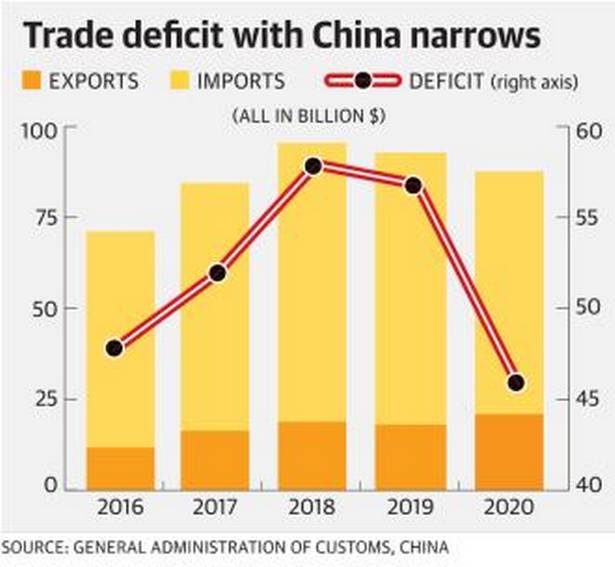
- Having a deficit is not a major cause for concern in this globalised world, but India with all its natural resources having to rely on imports to such an extent is.
- Steps like increasing import duty may have certain benefits but it also hurts the local procurer and customer with no domestic alternatives.
- Major hurdle in this path is inefficient use of Human Resource. Despite being a $3 trillion economy majority population still depend on agriculture for income.
- Government is required to get out of the socialistic mindset of owning every major sector and create space for private players to involve themselves.
- MSME are the backbone of any country. Red tapism is the major hurdle for them.
- Scrapping of many outdated colonial laws as recommended by many law commissions must be taken.
India- China has a long history of trade. It goes back even before China wall was built. Silk route trade route dated second century BC till 14 AD was one of the most important sources of income for India during those times. It stretched from China till Italy. The name derived from the heavy silk trading going on in this route. The relationship extend to cultural and religious exchanges as well.
In the year 1984, India and China entered into trade agreement which provided them with status of most favoured nation. 1992 was a landmark year when India China agreed on full fledged bilateral trade relations.
During recent decades trade has shifted in favour of China. In 2020, India China trade deficit stood at $45billion. Exports rose 16.15% compared to previous year led by iron, aluminium, steel and other mineral ores. Organic chemicals, telecom instruments, plastic products were top imports from China. Although deficits has decreased compared to previous years, it is still early to conclude if the trend continues or it is one of the effects of global pandemic and Galwan border tensions.
Having a deficit is not a major cause for concern in this globalised world, but India with all its natural resources having to rely on imports to such an extent is. There is also case that most exports to China are primary goods and raw materials while the imports have been intermediate and finished products. For example in this digital age India heavily rely on China for telecom products with no indigenous alternative . This has its security implications which has been raised by many defence experts.
Ways to plug the deficit
In recent years there has been many steps taken by the government to increase the manufacturing domestically. Production linked incentive to domestic manufacturers, mandating local content in public procurement, prohibition of certain imports, anti-dumping probes and tightening the scrutiny of imports through FTA partners are taken to decrease the deficit. China was also one of the major reasons for declining from RCEP.
Steps like increasing import duty may have certain benefits but it also hurts the local procurer and customer with no domestic alternatives. That is the key, rather than looking at China as an antagonist, this must be seen as an opportunity for local businesses to step in and satisfy the demands.

Major hurdle in this path is inefficient use of Human Resource. Despite being a $3 trillion economy majority population still depend on agriculture for income. The old techniques and processes are no longer effective or durable in the Industrial Age. Major chunk of labour force is wasted in form of disguised unemployment where 2 or 3 men do the work that can be done by single person with modern techniques. Government must step in and help these people by reskilling them for the necessities of 21st century.
For example farmers could be taught techniques of urban gardening, terrace gardens or multilevel farming which not only utilise their traditional knowledge but also increase the output. Similarly many traditional toy makers are suffering losses but if they could be educated in the ways of modern world they could be an excellent alternative to the cheap plastic Chinese products that dominate the market.
Socialist Mindset and Red Tape
As the saying goes “If king is a trader, his subjects will be beggars”. Government is required to get out of the socialistic mindset of owning every major sector and create space for private players to involve themselves.
Logistics cost is one of the main concern of Indian businesses. By creating decent infrastructure India can be an attractive destination for foreign investors and encourage domestic business to expand.
Railways and waterways are under-utilised in India for transport. By building the necessary infrastructures like ports, water transports logistic costs of businesses can be reduced substantially, thereby reducing the cost of products.
Having a deficit is not a major cause for concern in this globalised world, but India with all its natural resources having to rely on imports to such an extent is.
China is the major supplier of lithium ion batteries which are used in electric vehicles. This can be an hurdle inn shifting towards electric vehicles long term. Research on Alternate sources of fuels like bio ethanol, hydrogen gas must be given importance so as to reduce the dependence. This will be advantageous to farmers to gain some extra income.
MSME are the backbone of any country. Red tapism is the major hurdle for them. Scrapping of many outdated colonial laws as recommended by many law commissions must be taken. These are bread and butter for many corrupt officials and antisocial elements to trouble small businesses for monetary gain. Easy capital procurement and directional support through ngos will help people to navigate initial hurdles.
At the individual level an attitudinal shift is vital for any progress in the direction of self reliance. Development of entrepreneurial attitude and learning of skill is the necessity of the day.
Decreasing the deficit doesn’t imply going back to pre 1991 era of isolation, but it is vital to balance trade relations and promote indigenous market is necessary for the stable growth of a nation. This crucial juncture of history where India has advantage demographic dividend must be utilised to build an ‘Aatmanirbhar Bharat‘.
Shreyas has an M.Sc. in Psychology and serves in NIMHANS. He writes regularly on politics, society, international affairs and technology. Views expressed are the author’s own and do not necessarily reflect the views of SamvadaWorld or its staff.
